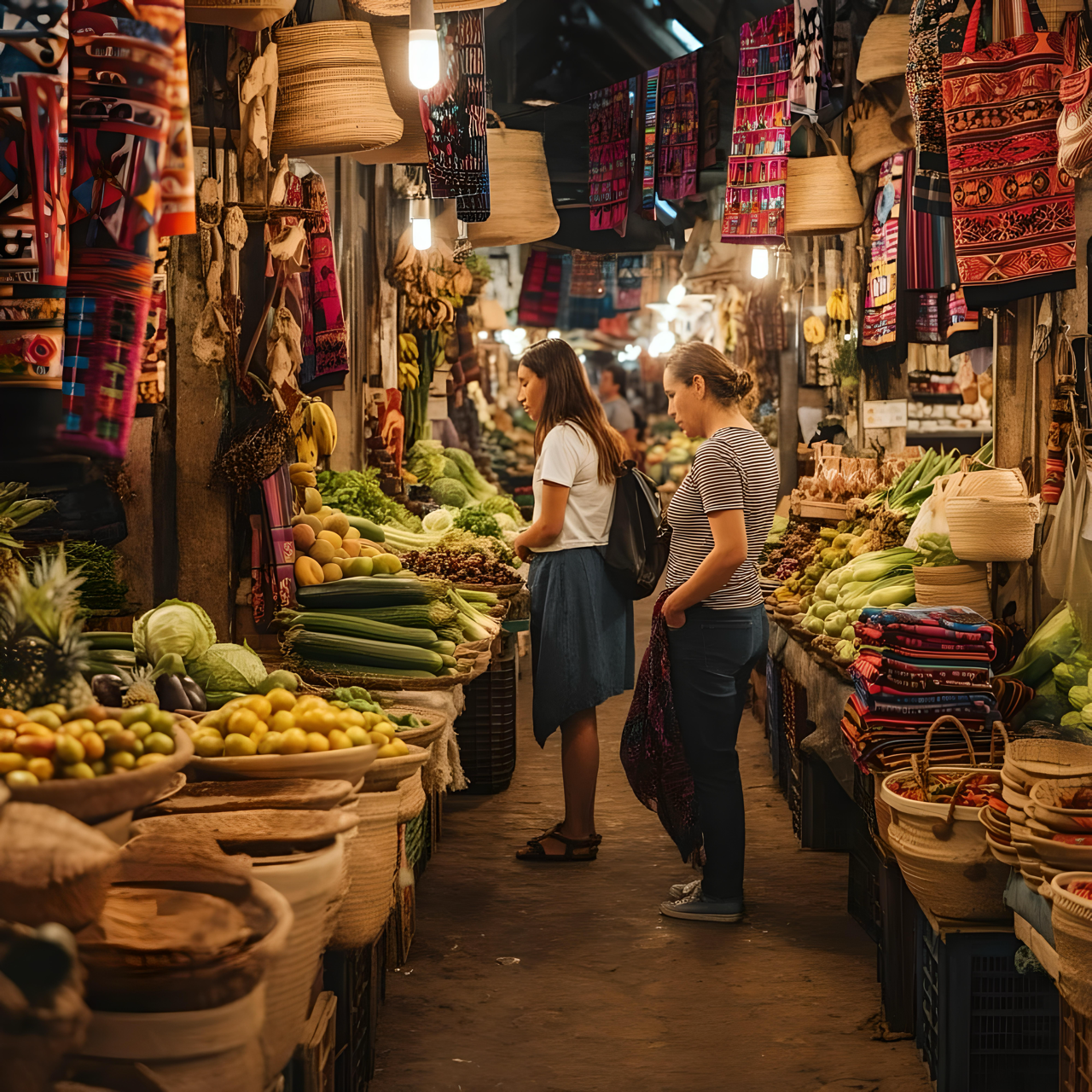Regenerative Travel: Key Principles and Benefits for LGBTQ+ Travelers and Local Communities
 Levi M Hankins
Levi M Hankins
This article explores regenerative travel, highlighting its principles of actively restoring and rejuvenating environments and communities, with a special focus on queer travelers. It emphasizes how regenerative travel can support local economies, foster cultural exchange, and promote LGBTQ+ rights. The piece also offers practical strategies for travelers to make positive impacts and discusses the unique challenges and opportunities queer travelers face. Overall, it advocates for responsible and inclusive tourism that benefits both travelers and local destinations.
Introduction
This article aims to explore the concept of regenerative travel and its potential to support local communities and promote economic growth, with a particular focus on queer travelers. By understanding the principles of regenerative travel, we can create more inclusive and sustainable travel experiences that benefit both travelers and the destinations they visit.

Definition and principles of regenerative travel
Regenerative travel goes beyond sustainability by actively seeking to restore and rejuvenate the environments and communities impacted by tourism. It emphasizes reciprocity, relationship-building, and a deep respect for local perspectives and traditions. The goal is to leave a positive, lasting impact on the places we visit, ensuring that tourism contributes to the well-being of local ecosystems and societies.
Importance of focusing on queer travelers
Queer travelers often face unique challenges and opportunities when exploring new destinations. By focusing on their experiences, we can highlight the importance of creating safe, inclusive, and supportive travel environments. This not only enhances the travel experience for queer individuals but also fosters greater understanding and acceptance within local communities. Through regenerative travel, queer travelers can play a vital role in promoting global and local LGBTQ+ rights while contributing to the overall growth and development of the destinations they visit.
wright the understasnding regenerative travel section Understanding Regenerative Travel Concept and differences from sustainable travel Key principles of regenerative travel Reciprocity and relationship-building Local perspectives and traditions Environmental restoration
Understanding Regenerative Travel

Concept and differences from sustainable travel
Regenerative travel is an evolved form of sustainable travel. While sustainable travel aims to minimize negative impacts on the environment and local communities, regenerative travel goes a step further by actively seeking to restore and rejuvenate them. It focuses on creating a net positive impact, ensuring that tourism activities contribute to the health and vitality of ecosystems and societies rather than merely reducing harm.
Key principles of regenerative travel
Regenerative travel is guided by several key principles that distinguish it from other forms of tourism:
Holistic Approach: It considers the interconnectedness of social, environmental, and economic systems, aiming to benefit all aspects of a destination.
Active Restoration: It involves activities that actively restore and enhance local environments and communities.
Community Engagement: It prioritizes the involvement and empowerment of local communities in tourism planning and decision-making.
Long-term Thinking: It focuses on long-term benefits and sustainability, rather than short-term gains.
Reciprocity and relationship-building
A core tenet of regenerative travel is reciprocity, which involves creating mutually beneficial relationships between travelers and local communities. This means that travelers not only take from their experiences but also give back in meaningful ways. Building genuine relationships with local people, understanding their needs, and contributing to their well-being are essential aspects of this principle.
Local perspectives and traditions
Respecting and valuing local perspectives and traditions is crucial in regenerative travel. This involves learning about and honoring the cultural heritage, practices, and wisdom of the communities visited. By doing so, travelers can foster deeper connections and contribute to the preservation and celebration of local cultures.
Environmental restoration
Environmental restoration is a fundamental component of regenerative travel. This can include activities such as reforestation, habitat restoration, and conservation efforts. The goal is to leave the natural environment in a better state than it was found, ensuring that tourism contributes positively to the planet's health and biodiversity.
Significance of Supporting Local Communities Economic impact of tourism on local economies Cultural exchange and mutual respect Long-term benefits for communities write this section
Significance of Supporting Local Communities
Economic impact of tourism on local economies
Tourism can significantly boost local economies by creating jobs, generating income, and stimulating various sectors such as hospitality, transportation, and retail. When travelers spend money on local services, accommodations, and products, it directly benefits the community. This influx of revenue can lead to improved infrastructure, better public services, and increased investment in local businesses, fostering overall economic growth.
Cultural exchange and mutual respect
Tourism provides a unique opportunity for cultural exchange, allowing travelers and local communities to share and learn from each other's traditions, customs, and ways of life. This exchange fosters mutual respect and understanding, breaking down stereotypes and promoting tolerance. By engaging with local cultures in a respectful and meaningful way, travelers can contribute to the preservation and celebration of cultural heritage, ensuring that it is passed down to future generations.
Long-term benefits for communities
Supporting local communities through tourism can have long-term benefits that extend beyond immediate economic gains. Sustainable and regenerative tourism practices can lead to the development of resilient communities that are better equipped to handle future challenges. By prioritizing local needs and involving community members in decision-making processes, tourism can empower individuals and promote social cohesion. Additionally, the focus on environmental restoration and conservation can ensure that natural resources are preserved for future generations, creating a sustainable foundation for continued growth and prosperity.
Economic Growth through Regenerative Travel Job creation and business opportunities Development of infrastructure and services Promoting local products and crafts write
Economic Growth through Regenerative Travel
Job creation and business opportunities
Regenerative travel can lead to significant job creation and business opportunities within local communities. By prioritizing local hiring and supporting small businesses, tourism can provide stable employment and foster entrepreneurship. This not only helps reduce poverty but also encourages the development of a diverse and resilient local economy. Jobs in hospitality, tour guiding, transportation, and other related sectors can thrive, contributing to the overall economic well-being of the community.
Development of infrastructure and services

The influx of tourists can drive the development of essential infrastructure and services in local areas. Investments in transportation, healthcare, education, and public utilities can be spurred by the need to accommodate and serve visitors. Improved infrastructure not only benefits tourists but also enhances the quality of life for local residents. This development can lead to better connectivity, access to resources, and overall community growth.
Promoting local products and crafts
Regenerative travel emphasizes the importance of supporting local artisans and producers. By promoting and purchasing local products and crafts, travelers can help sustain traditional skills and cultural heritage. This support can lead to increased demand for locally made goods, providing artisans with a stable income and encouraging the preservation of unique cultural practices. Additionally, showcasing local products to a global audience can open up new markets and opportunities for local businesses, further driving economic growth.
Unique Challenges and Opportunities for Queer Travelers
Safety and acceptance in travel destinations
Queer travelers often face unique challenges related to safety and acceptance when exploring new destinations. In some regions, LGBTQ+ individuals may encounter legal restrictions, social stigma, or even hostility. It is crucial for queer travelers to research and choose destinations that are known for their LGBTQ+ friendliness and inclusivity. Understanding local laws, cultural attitudes, and potential risks can help ensure a safer and more enjoyable travel experience.
Building inclusive and supportive networks
One of the opportunities for queer travelers is the ability to build and connect with inclusive and supportive networks. Many destinations have vibrant LGBTQ+ communities, organizations, and events that can provide valuable resources and a sense of belonging. Engaging with these networks can enhance the travel experience by offering insider tips, safe spaces, and opportunities to meet like-minded individuals. Additionally, supporting LGBTQ+ businesses and initiatives can contribute to the economic and social well-being of these communities.
Strategies for Implementing Regenerative Travel
Choosing the right destinations and travel partners
Selecting destinations and travel partners that align with regenerative travel principles is crucial. Look for places that prioritize sustainability, community engagement, and environmental restoration. Research destinations that have established eco-friendly practices and support local communities. Similarly, choose travel companies and partners that are committed to regenerative tourism, ensuring that your travel choices contribute positively to the places you visit.

Engaging in meaningful and respectful cultural exchanges
Meaningful and respectful cultural exchanges are at the heart of regenerative travel. Take the time to learn about the local culture, traditions, and customs of the destinations you visit. Engage with local communities in a way that is respectful and appreciative of their heritage. Participate in cultural activities, support local artisans, and seek out authentic experiences that foster mutual understanding and respect. Building genuine connections with local people can lead to a more enriching travel experience for both travelers and hosts.
Practical tips for travelers to contribute positively
Support Local Businesses: Choose locally-owned accommodations, restaurants, and shops to ensure that your spending directly benefits the community.
Minimize Environmental Impact: Practice eco-friendly habits such as reducing waste, conserving water, and using public transportation or eco-friendly travel options.
Volunteer and Participate in Conservation Efforts: Engage in volunteer opportunities or participate in conservation projects that help restore and protect the local environment.
Educate Yourself and Others: Learn about the social and environmental issues facing the destinations you visit and share this knowledge with others to raise awareness.
Respect Local Customs and Traditions: Show respect for local customs, dress codes, and traditions. Be mindful of your behavior and its impact on the local community.
Give Back: Consider donating to local charities or organizations that support community development and environmental conservation.
By implementing these strategies, travelers can contribute to the well-being of the destinations they visit, ensuring that their travel experiences are both enjoyable and regenerative.
Benefits for Queer Travelers
Enhanced travel experiences
Queer travelers can enjoy enriched travel experiences by engaging in regenerative travel. By choosing destinations and activities that prioritize inclusivity and sustainability, they can explore new cultures and environments in a way that feels safe and welcoming. This approach allows for deeper connections with local communities and more meaningful interactions, making travel more fulfilling and memorable.
Contribution to global and local LGBTQ+ rights
Traveling as a queer individual can also contribute to the advancement of LGBTQ+ rights both globally and locally. By supporting LGBTQ+ friendly destinations and businesses, queer travelers can help promote acceptance and visibility. Their presence and engagement can encourage local communities to adopt more inclusive practices and policies, fostering a more tolerant and supportive environment for all.
Personal growth and community building
Regenerative travel offers opportunities for personal growth and community building. Queer travelers can gain new perspectives, learn about different cultures, and develop a greater appreciation for diversity. Engaging with local LGBTQ+ communities and participating in cultural exchanges can strengthen a sense of belonging and solidarity. Additionally, supporting local initiatives and contributing to community development can create lasting positive impacts, both for the traveler and the communities they visit.
Conclusion
Summary of key points
This article has explored the concept of regenerative travel and its potential to support local communities and promote economic growth, with a particular focus on queer travelers. We have discussed the principles of regenerative travel, including its holistic approach, active restoration, community engagement, and long-term thinking. The significance of supporting local communities through tourism was highlighted, emphasizing economic impact, cultural exchange, and long-term benefits. Additionally, we examined how regenerative travel can drive economic growth through job creation, infrastructure development, and the promotion of local products and crafts. Unique challenges and opportunities for queer travelers were also addressed, along with strategies for implementing regenerative travel and the benefits it offers to queer individuals.
Embark on Your Journey of Positive Impact
As you embark on your next journey, remember that your choices have the power to shape not just your experience, but the world around you. Here's how you can make a positive impact:
Choose Wisely: Seek out destinations and travel partners that embrace regenerative travel principles. Look for those committed to environmental sustainability, cultural preservation, and community well-being.
Engage Meaningfully: Immerse yourself in authentic cultural exchanges. Approach local customs and traditions with curiosity, respect, and an open mind. Your genuine interest can foster mutual understanding and appreciation.
Give Back: Find ways to contribute positively to the communities you visit. This could mean supporting local businesses, participating in community projects, or simply being mindful of your environmental footprint.
Embrace Inclusivity: Support travel companies and destinations that prioritize creating safe and welcoming experiences for all travelers, regardless of their background or identity.
Stay Informed: Before you travel, research the local culture, customs, and current issues affecting your destination. This knowledge will enrich your experience and help you travel more responsibly.
Spread the Word: Share your positive experiences with responsible travel. Inspire others by highlighting the benefits of sustainable and inclusive tourism practices.
Remember, every journey is an opportunity to make a difference. By traveling responsibly, you're not just a tourist – you're a global citizen, contributing to a more sustainable and inclusive world.
Future outlook for regenerative travel and queer travelers
The future of regenerative travel looks promising, with increasing awareness and commitment to sustainability and inclusivity. As more travelers, communities, and travel companies embrace regenerative principles, the positive impact on local ecosystems and societies will continue to grow. Queer travelers, in particular, have the opportunity to play a vital role in promoting global and local LGBTQ+ rights while enjoying enriched travel experiences. By fostering mutual respect, understanding, and support, regenerative travel can create a more inclusive and sustainable world for everyone
Subscribe to my newsletter
Read articles from Levi M Hankins directly inside your inbox. Subscribe to the newsletter, and don't miss out.
Written by

Levi M Hankins
Levi M Hankins
Passionate traveler and storyteller, dedicated to celebrating the spirit of adventure and community within the LGBTQ+ travel sphere. With a keen eye for luxury and a heart for sustainability, I aim to inspire and inform through captivating narratives and stunning visuals. Join me as we explore the world with pride and purpose, fostering a sense of belonging and empowerment for all.